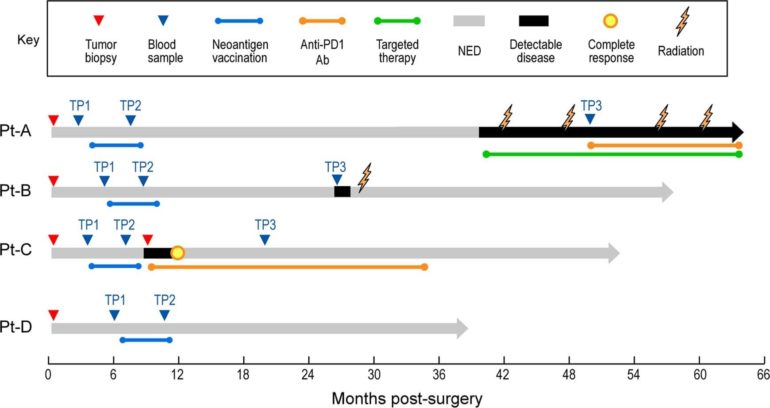T cells rely on surface proteins called T cell receptors (TCRs) to bind to and destroy viruses, cancer cells, and other invaders in the body. T cells that infiltrate tumors, however, can have varied, sometimes ineffective responses. How the molecular structure and function of TCRs correlates with T cell behavior is not fully understood.
In a new study published in Nature, Giacomo Oliviera, associated researcher and institute member Catherine Wu, and colleagues at the Dana-Farber Cancer Institute and the Cancer Program at the Broad Institute of MIT and Harvard take an in-depth look at the relationship between TCRs and T cell phenotypes. Using single cell RNA (scRNAseq) sequencing and TCR sequencing (scTCRseq) of CD8+ T cells, coupled with the detection of surface proteins, the researchers set out to study the transcriptomic and molecular profiles of melanoma tumor-invading T cells and their TCRs. They found that most T cells with tumor-specific TCRs bore the molecular signs of “exhaustion,” a state of decreased function following chronic antigen exposure. Higher circulating levels of these tumor-invading, exhausted T cells in the blood correlated with persistent disease. These findings highlight the importance of restoring normal T cell function for a productive, effective immune response in cancer therapies.
In the video presentation above, Oliveira describes the research that led to the identification of the properties of antitumor T cells and highlights how such findings can pave the road to the development of novel therapeutic strategies that aim at generating T cells with potent antitumor TCRs and functional cell states.
Advancing the study of T cells to improve immunotherapy
More information:
Giacomo Oliveira et al, Phenotype, specificity and avidity of antitumour CD8+ T cells in melanoma, Nature (2021). DOI: 10.1038/s41586-021-03704-y
Provided by
Broad Institute of MIT and Harvard
Citation:
What makes some immune cells better at killing melanoma (2021, July 27)
retrieved 27 July 2021
from https://medicalxpress.com/news/2021-07-immune-cells-melanoma.html
This document is subject to copyright. Apart from any fair dealing for the purpose of private study or research, no
part may be reproduced without the written permission. The content is provided for information purposes only.



